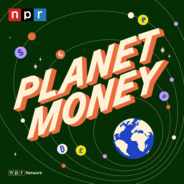For decades, the U.S. has been the single biggest source of remittances worldwide. A remittance is a transfer of money, typically from an immigrant to their family in their country of origin. But we are in the middle of a big, loud and very public immigration crackdown on those who are here without legal status. And that crackdown is disrupting the global remittance market. People who have come to the U.S. from a handful of countries — especially some Central American countries — have been sending more money back to their countries of origin. And it’s a bit of a puzzle because … you might think the opposite would be the case.As immigration plummets, we try to figure out why remittances are surging in some countries, and not others. And we learn why a surge in money sent home inspires joy — but also fear.Pre-order the Planet Money book and get a free gift. / Subscribe to Planet Money+Listen free: Apple Podcasts, Spotify, the NPR app or anywhere you get podcasts.Facebook / Instagram / TikTok / Our weekly Newsletter.Register here for our live Zoom event about our board game project on November 1st.This episode was hosted by Erika Beras and Greg Rosalsky. It was produced by Luis Gallo with help from Sam Yellowhorse Kesler. It was edited by Marianne McCune with fact-checking help from Sierra Juarez. It was engineered by Patrick Murray. Alex Goldmark is Planet Money’s executive producer.Learn more about sponsor message choices: podcastchoices.com/adchoicesNPR Privacy Policy

Wirtschaft
Planet Money Folgen
Wanna see a trick? Give us any topic and we can tie it back to the economy. At Planet Money, we explore the forces that shape our lives and bring you along for the ride. Don't just understand the economy – understand the world.Wanna go deeper? Subscribe to Planet Money+ and get sponsor-free episodes of Planet Money, The Indicator, and Planet Money Summer School. Plus access to bonus content. It's a new way to support the show you love. Learn more at plus.npr.org/planetmoney
Folgen von Planet Money
355 Folgen
-
Folge vom 30.10.2025The remittance mystery
-
Folge vom 24.10.2025Should the fine have to fit the crime?The U.S. Constitution famously outlaws “cruel and unusual punishments.” But there's another, far more obscure part of the Constitution called the Excessive Fines Clause, which basically says that the fine has to fit the crime. So far, the Supreme Court has been pretty mysterious about what that means. But for Ken Jouppi, the fate of his $95,000 plane hinges on it.Ken is a bush pilot. He used to run an air taxi service in Fairbanks, Alaska. In 2012, police caught one of Ken’s passengers with a six-pack of Budweiser in her luggage. Over that six-pack, Ken was convicted of bootlegging. As punishment, he was ordered to forfeit his $95,000 Cessna.The Supreme Court is now considering whether to take Ken’s case. And what’s at stake here is more than just a plane. Hanging in the balance is an increasingly popular — and controversial — business model for criminal justice.More on economics and the law: - Fine and punishment - The prisoner's solution - Paying for the crime - Rescues at sea, and how to make a fortunePre-order the Planet Money book and get a free gift. / Subscribe to Planet Money+Listen free: Apple Podcasts, Spotify, the NPR app or anywhere you get podcasts.Facebook / Instagram / TikTok / Our weekly Newsletter.Today’s episode was produced by James Sneed and Sam Yellowhorse Kesler with help from Luis Gallo. It was edited by Jess Jiang, fact-checked by Sierra Juarez and engineered by Ko Tagasugi Chernovin with help from Robert Rodriguez. Planet Money's executive producer is Alex Goldmark.Learn more about sponsor message choices: podcastchoices.com/adchoicesNPR Privacy Policy
-
Folge vom 22.10.2025TikTok’s Trojan Horse StrategyWhen TikTok videos started to go viral on Instagram and Reddit, TikTok turned to professional sound designers to protect their content.More and more companies are paying to develop a “sonic identity” – a series of sounds, songs, and micro-jingles to help maintain a unified brand.In this episode, in conjunction with the sound design podcast Twenty Thousand Hertz, we hear the backstory to possibly the most successful audio branding campaigns in history. It’s a tale of guerilla marketing and the power of sonic suggestion.Pre-order the Planet Money book, and get a free gift / Subscribe to Planet Money+Listen free: Apple Podcasts, Spotify, the NPR app or anywhere you get podcasts.Facebook / Instagram / TikTok / Our weekly Newsletter.This adapted episode was hosted by Kenny Malone and Dallas Taylor. It was produced by Casey Emmerling and James Sneed. The episode was edited by Jess Jiang. Alex Goldmark is our Executive Producer.Learn more about sponsor message choices: podcastchoices.com/adchoicesNPR Privacy Policy
-
Folge vom 17.10.2025How Russia’s shadow fleet is sailing around oil sanctionsBjarne Caesar Skinnerup works as a maritime pilot in the straits of Denmark. That means he’s used to seeing oil tankers. But after the start of the war in Ukraine, the tankers started getting weird. They were flying flags he’d never seen before. They were old, very old, though many had taken on new names. Something was off. He’d stumbled on a shadow fleet of hundreds of tankers ferrying sanctioned oil out of Russia … with near impunity. Today on the show, how those ships are transforming the global oil market and fueling the war in Ukraine. And why this all might be a financial and environmental disaster waiting to happen.Pre-order the Planet Money book and get a free gift. / Subscribe to Planet Money+Listen free: Apple Podcasts, Spotify, the NPR app or anywhere you get podcasts.Facebook / Instagram / TikTok / Our weekly Newsletter.This episode was hosted by Alexi Horowitz-Ghazi and Daniel Ackerman. It was produced by Willa Rubin and edited by Marianne McCune. It was fact-checked by Sierra Juarez and engineered by Kwesi Lee and Cena Loffredo. Alex Goldmark is our executive producer.Learn more about sponsor message choices: podcastchoices.com/adchoicesNPR Privacy Policy
